

Travellers refusing digital search now face $5000 Customs fine. Travellers who refuse to hand over their phone or laptop passwords to Customs officials can now be slapped with a $5000 fine.
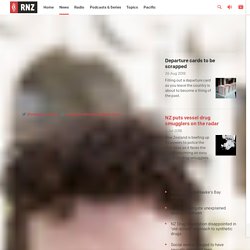
Photo: 123rf.com The Customs and Excise Act 2018 - which comes into effect today - sets guidelines around how Customs can carry out "digital strip-searches". Previously, Customs could stop anyone at the border and demand to see their electronic devices. The Storm is Here Deep State Exposed Documentary 2018. Sessions, Coats push for permanent renewal of controversial surveillance law. Congress Slips CISA Into a Budget Bill That's Sure to Pass. Update 12/18/2015 12pm: The House and Senate have now passed the omnibus bill, including the new version of CISA.
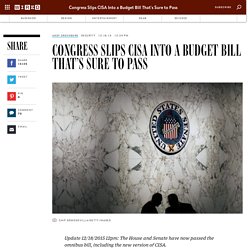
Privacy advocates were aghast in October when the Senate passed the Cybersecurity Information Sharing Act by a vote of 74 to 21, leaving intact portions of the law they say make it more amenable to surveillance than actual security. Now, as CISA gets closer to the President’s desk, those privacy critics argue that Congress has quietly stripped out even more of its remaining privacy protections. In a late-night session of Congress, House Speaker Paul Ryan announced a new version of the “omnibus” bill, a massive piece of legislation that deals with much of the federal government’s funding. It's Already Happening: Authorities Are Using Paris Attacks To Rush New Mass Surveillance Laws. The CIA and government officials around the world are using the Paris attacks to push brand new surveillance laws.

And it was all planned in advance. While democratic systems usually take months (if not years) to pass new laws and legislation, it only took a few days after the Paris attacks to slap honest citizens with more surveillance laws. Several organizations are indeed capitalizing on the fear and panic caused by the attacks to bring forth a brand new agenda that takes a bold new step towards total government surveillance. What’s worse: Leaked information proves that authorities were waiting on a terror attack to go forward with their plan. In a leaked e-mail written by Robert S. Only a few months after this e-mail, a terror attack occurs in Paris. Britain’s surveillance state ‘worse than bad joke’ – UN privacy chief to RT. Britain’s oversight of surveillance is “worse than a bad joke,” UN Special Rapporteur on Privacy Joseph Cannataci told RT.
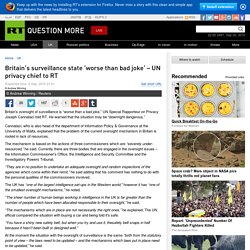
He warned that the situation may be “downright dangerous.” Cannataci, who is also head of the department of Information Policy & Governance at the University of Malta, explained that the problem of the current oversight mechanism in Britain is rooted in lack of resources. The mechanism is based on the actions of three commissioners which are “severely under-resourced,” he said.
Data retention and the end of Australians' digital privacy. Data retention laws: Should we worry?
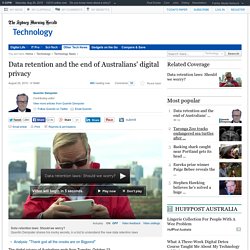
Quentin Dempster shares his murky secrets, in a bid to understand the new data retention laws Analysis: "Thank god all the crooks are on Bigpond" The digital privacy of Australians ends from Tuesday, October 13. French court backs mass surveillance. The constitutional court in France on Thursday (23 July) broadly approved a new law that gives the state wide-sweeping surveillance powers.
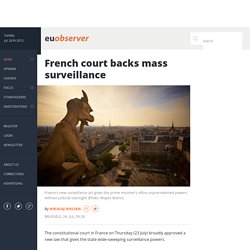
First proposed in March in the aftermath of the Charlie Hebdo shootings in Paris, the Surveillance Act allows French intelligence agencies to spy on citizens with almost complete impunity. “From now on, France has a security framework against terrorism that respects liberties. The NSA’s Technotyranny: One Nation Under Surveillance. The NSA’s Technotyranny: One Nation Under Surveillance By John W.
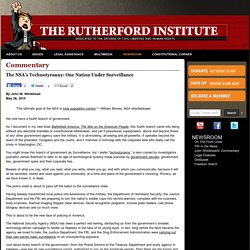
WhiteheadMay 26, 2015. Apple and Google Just Attended a Confidential Spy Summit in a Remote English Mansion. At an 18th-century mansion in England’s countryside last week, current and former spy chiefs from seven countries faced off with representatives from tech giants Apple and Google to discuss government surveillance in the aftermath of Edward Snowden’s leaks.
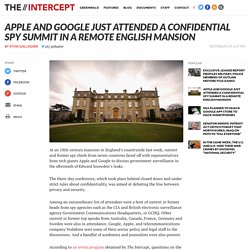
The three-day conference, which took place behind closed doors and under strict rules about confidentiality, was aimed at debating the line between privacy and security. Among an extraordinary list of attendees were a host of current or former heads from spy agencies such as the CIA and British electronic surveillance agency Government Communications Headquarters, or GCHQ. Other current or former top spooks from Australia, Canada, France, Germany and Sweden were also in attendance. Google, Apple, and telecommunications company Vodafone sent some of their senior policy and legal staff to the discussions. And a handful of academics and journalists were also present. ‘Sneak and Peek’ Bill Rolls Quietly Through Virginia General Assembly. ‘Sneak and Peek’ Bill Rolls Quietly Through Virginia General Assembly February 04, 2015 RICHMOND, Va. — Virginia lawmakers want to give local and state authorities the same sweeping search-and-seizure powers used by the FBI and other federal agencies under the Patriot Act.
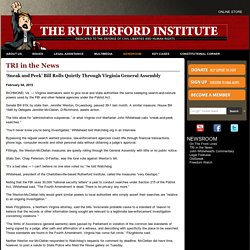
Senate Bill 919, by state Sen. Jennifer Wexton, D-Leesburg, passed 39-1 last month. A similar measure, House Bill 1946 by Delegate Jennifer McClellan, D-Richmond, awaits action. EFF Grabs Two More Docs From The NSA, Detailing Expanded Post-9/11 Surveillance Powers And Section 702 Justifications. Thanks to its ongoing FOIA lawsuit against the NSA, the EFF has managed to secure another set of documents detailing the legal rationalizations behind the intelligence agency's "collect it all" approach, as well as the FISA's courts approval of expanded surveillance powers in the wake of the 9/11 attacks.
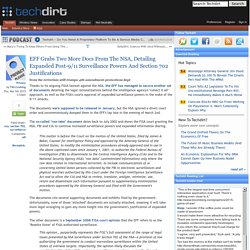
The documents were supposed to be released in January, but the NSA ignored a direct court order and unceremoniously dumped them in the EFF's lap late in the evening of March 2nd. The so-called "raw take" document dates back to July 2002 and shows the FISA court granting the NSA, FBI and CIA to continue increased surveillance powers and expanded information sharing. NSA Spy Program So Secret Judge Can't Explain Why It Can't Be Challenged. A federal judge ruled in favor of the National Security Agency in a key surveillance case on Tuesday, dismissing a challenge which claimed the government's spying operations were groundless and unconstitutional.
Filed in 2008 by the Electronic Frontier Foundation, the lawsuit, Jewel v. NSA, aimed to end the agency's unwarranted surveillance of U.S. citizens, which the consumer advocacy group said violated the 4th Amendment. The lawsuit also implicated AT&T in the operations, alleging that the phone company "routed copies of Internet traffic to a secret room in San Francisco controlled by the NSA.
" Court: Ability to police U.S. spying program limited. “The FISC is forced to rely upon the accuracy of the information that is provided to the Court,” its chief, U.S. District Judge Reggie B. Government Lies About Spying Again and Again ... Here's What's REALLY Going On Washington's Blog. DEA secretly tracked Americans' calls for over a decade, new court document reveals. Secret-court judges upset at portrayal of ‘collaboration’ with government. U.S. District Judge Colleen Kollar-Kotelly, the former chief judge of the Foreign Intelligence Surveillance Court, took the highly unusual step Friday of voicing open frustration at the account in the report and court’s inability to explain its decisions.
Secret FISA court rubber stamps U.S. surveillance. Fisa court oversight: a look inside a secret and empty process. (updated below [Wed.]) Since we began began publishing stories about the NSA's massive domestic spying apparatus, various NSA defenders – beginning with President Obama - have sought to assure the public that this is all done under robust judicial oversight. "When it comes to telephone calls, nobody is listening to your telephone calls," he proclaimed on June 7 when responding to our story about the bulk collection of telephone records, adding that the program is "fully overseen" by "the Fisa court, a court specially put together to evaluate classified programs to make sure that the executive branch, or government generally, is not abusing them".
Obama told Charlie Rose last night: FISA court essentially rubber stamp for government. The secret government court put in place under the Foreign Intelligence Surveillance Act to review government efforts to spy on foreign nationals and American citizens without a warrant approved the vast majority of the government’s requests, a report published in The New York Times on Friday found. Cogs in the Machine. Cogs in the Machine: Big Data, Common Core, and National Testing. May 2014 A Pioneer Institute White Paper by Emmett McGroarty, Joy Pullmann, and Jane Robbins New technology allows advocates for education as workforce development to accomplish what has long been out of their reach: the collection of data on every child, beginning with preschool or even earlier, and using that data to track the child throughout his/her academic career and his/her progression through the workforce.
Nsa. Dear Privacy Board: It’s Us, the 95% There are seven billion people in the world, and 95 percent of them live outside the United States. Australian Government Pushing ‘Internet Tax’ To Pay For NSA Style Spying. Forcing private companies to become mass surveillance hubsSteve Watson Prisonplanet.com July 29, 2014.
Australia, ‘better slave than dead’ Csec. Asio. UK.gov hoovers up data on five-year-olds. Security and trust: The backbone of doing business over the internet The government obsession with collecting data has now extended to five-year-olds, as local Community Health Services get ready to arm-twist parents into revealing the most intimate details of their own and their child’s personal, behavioural and eating habits. The questionnaire – or "School Entry Wellbeing Review" – is a four-page tick-box opus, at present being piloted in Lincolnshire, requiring parents to supply over 100 different data points about their own and their offspring’s health.
Previously, parents received a "Health Record" on the birth of a child, which contained around eight questions which needed to be answered when that child started school. The Review asks parents to indicate whether their child "often lies or cheats": whether they steal or bully; and how often they eat red meat, takeaway meals or fizzy drinks.
‘Hostile to privacy’: Snowden urges internet users to get rid of Dropbox. Privacy Multistakeholder Process: Facial Recognition Technology. FISA Judge To Yahoo: If US Citizens Don't Know They're Being Surveilled, There's No Harm. Digital Storage as an Enabler of Authoritarian Governments.